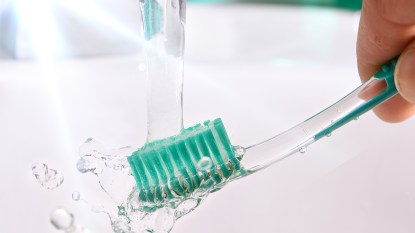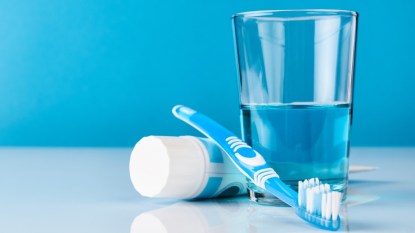Dentists Reveal 7 Foods for Healthy Gums, Including a Sweet Treat You’d Never Expect
Plus, the sip that practically guarantees cavity-free!
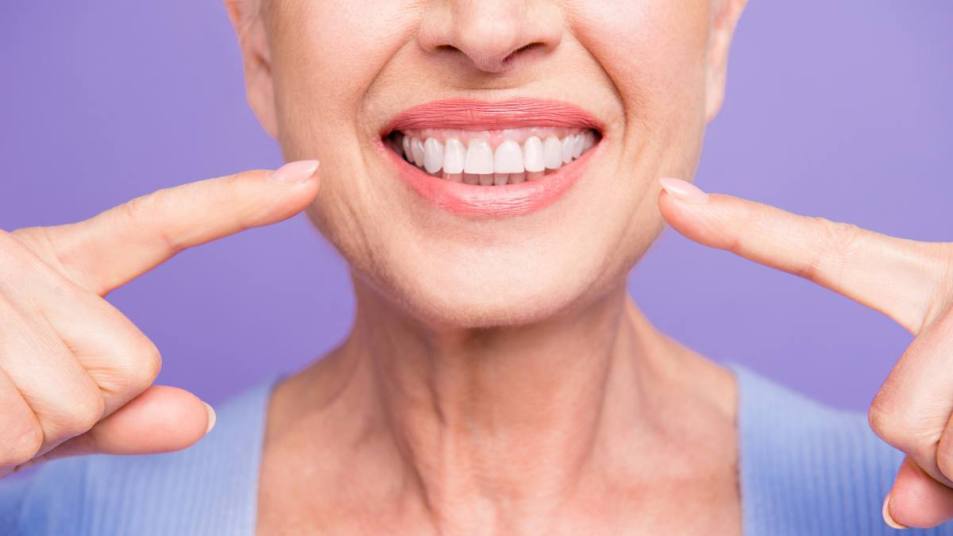
You know that brushing and flossing your teeth and regularly visiting your dentist is essential for good oral health. But even if you follow these guidelines and avoid bad habits like smoking, gum-related issues can still arise. Consider that up to 47% of adults 30 and older have some type of gum disease, according to the US Centers for Disease Control and Prevention (CDC). That number jumps to 70% of people 60 and older! Thankfully, making a few simple lifestyle changes can make a big difference in terms of gum disease prevention. For instance, your diet. The foods and beverages you consume directly affect your oral health. So we asked dentists for the best foods for healthy gums. Here, their top picks.
The link between diet and gum health
Our diets play a pivotal role in maintaining good overall health, especially when it comes to our gums, says Ed Zuckerberg, DDS, FAGD, a New York University (NYU) trained dentist with more than 30 years of experience, and the Chief Dental Officer at Viome.
“The food you consume daily can either nourish or harm the delicate balance of microbes residing in your mouth, akin to the ecosystem within your gut,” he explains. “This oral microbiome, influenced by diet, stress, habits like nail biting, teeth grinding and even external factors such as smoking and alcohol consumption, requires a careful balance to thrive.”
Alice Hoang, DMD, FAGD, FICOI, AADSM, founder of Brooklyn Mint Dental in New York City, echoes these sentiments. “Think of your gums as the skin in your mouth. They keep your teeth stable and form a critical barrier between deeper layers of bone and ultimately, the bloodstream,” she says. “When our mouths encounter sugar, the bacteria that cause cavities and gum disease feed on that sugar and then form an acid.”
Dr. Hoang says that these acids can end up destroying our teeth and gums and sometimes, even the bone that supports them. Therefore, “to maintain good oral hygiene, you should always consume a healthy diet filled with nutrients.”
Related: Dentists Reveal How to Get Rid of Canker Sores Fast + What Remedies Actually Make Them Worse
Foods for healthy gums: 7 dentist-recommended nutrients
“Many people assume that there are universally healthy foods or supplements beneficial for everyone’s oral health,” Dr. Zuckerberg says. “However, the reality is that our oral microbiomes are as unique as our fingerprints, and what works for one person may not work for another.”
Even so, the experts we spoke to said increasing your intake of specific nutrients can be a boon to your gums and oral health, in general. Here are 7 of their top recommendations:
1. Foods for healthy gums: Foods rich in vitamin C
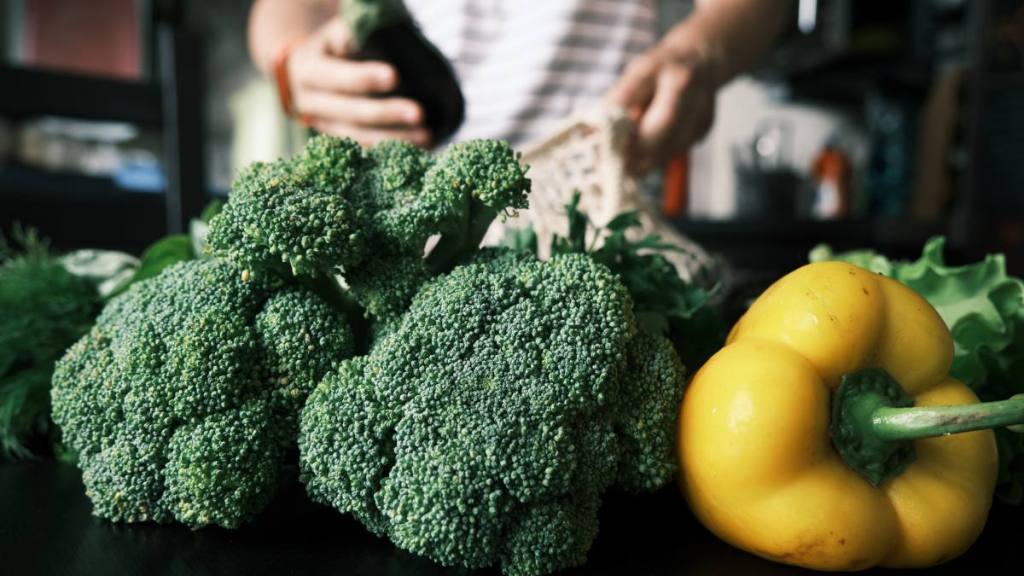
Vitamin C-rich foods include: broccoli, green bell peppers, tomatoes, oranges, pineapples, papayas, and lemons.
Vitamin C is an antioxidant that contributes to various bodily functions, but it’s particularly important in terms of oral health. That’s because it “helps to maintain the collagen proteins that make up our bones, teeth and gums,” Dr. Hoang explains. “With a prolonged lack of vitamin C, you can develop scurvy, made famous by pirates who lacked access to citrus fruits.”
Several studies have confirmed vitamin C’s contributions to gum health. One, published in the International Journal of Environmental Research and Public Health, concluded that participants who didn’t get enough vitamin C from their diet were more likely to develop gum disease. Similarly, those who consumed adequate amounts of vitamin C were less likely to develop gingivitis (a mild form of gum disease) and gum bleeding.
Another, published in Frontiers in Nutrition, determined that vitamin C plays a major role in reducing the severity of gum disease. The authors recommend eating fresh fruits and vegetables for optimal results.
Related: Beyond Vitamin C: The Other Essential Roles Citrus Fruits Play in Your Health
2. Fresh herbs
Fresh herbs good for gum health include: sage, peppermint, myrrh, cinnamon and echinacea.
According to Michael Kosdon, DDS, a nationally renowned cosmetic dentist and owner of Smiles of NYC, these plants can “help with gingival inflammation and promote healing.” A study published in the Journal of Periodontology assessed the effects of an herbal mouthwash containing chamomile, sage, mint, myrrh and echinacea. Participants who used the herbal mouthwash experienced a significant reduction in gum inflammation and bleeding gums compared to participants who used traditional mouthwash.
Researchers are still trying to understand what it is about these plants that make them so beneficial for gum health, but it’s thought they contain anti-inflammatory properties. Try adding them to salads and dishes. Or, if you prefer to drink your nutrients, sip an herbal tea.
3. Foods for healthy gums: Foods rich in vitamin A

Foods rich in vitamin A include: Leafy greens, carrots, pumpkin, and sweet potatoes.
Most of us associate vitamin A with healthy vision. Remember how Mom always told you to eat your carrots? However, Dr. Hoang says it’s also “one of the best vitamins for healthy gums.”
Why? Because it’s key to saliva production. “Saliva plays a very important role in cleaning the mouth of bacteria and food particles,” Dr. Hoang explains. “Vitamin A deficiency can lead to inflammation of the mucous membrane, loosening of the teeth, dryness and microtrauma in the oral cavity.” In other words, without adequate vitamin A, your gums might run into trouble.
Related: Taking Too Much Vitamin A May Trigger Hair Loss + Bone Thinning and Liver Damage
4. Honey
Remember how we said sugary foods were bad for gum health? There’s one exception to this rule: honey! In fact, Dr. Kosdon says that “eating honey helps disinfect and stimulate healing in oral tissue.” Indeed, one study, conducted by researchers in Saudi Arabia, found that applying honey to the gums helped eliminate harmful oral bacteria. It also reduced the risk of cavities and gum disease in people finishing orthodontic treatment. Another study, published in Contemporary Clinical Dentistry, concluded that manuka honey (a special type of honey made by bees native to Australia and New Zealand) was better at reducing plaque than regular mouthwash.
Since honey contains lots of sugar, it’s best to consume it in moderation. Still, adding it to a cup of tea or gently rubbing it on inflamed or irritated gums may provide significant relief.
Related: Acid Reflux? This Type of Honey Works When Heartburn Medicines Don’t
5. Foods for healthy gums: Foods that contain vitamin D
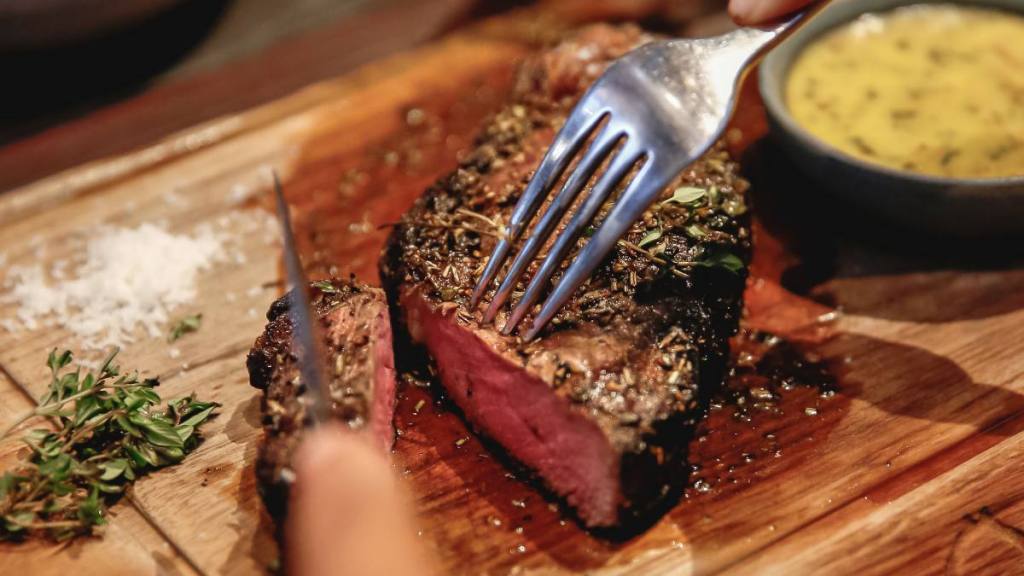
Vitamin D-rich foods include: oily fish (e.g., tuna, mackerel and salmon), egg yolks and red meat
Reading up to this point, you might assume that the only gum-friendly foods are fruits and vegetables, but that isn’t the case. Being an omnivore has plenty of advantages, particularly when it comes to vitamin D.
Dr. Hoang says vitamin D supports oral health by contributing to tooth mineralization (the body’s natural way of repairing tooth enamel.) Similarly, “it improves gum health by strengthening the body’s antibacterial defense systems and reducing inflammation. It also helps maintain the structure of the gums and the ligament that supports the teeth, preventing periodontitis (a severe form of gum disease) and subsequent tooth loss.”
Considering that vitamin D deficiency has been linked to gum disease, tooth decay and dry mouth, it’s no wonder dentists recommend it.
Related: If You Take Vitamin D, You May Need This Other Vitamin to Reduce Calcium Clogging in Your Arteries
6. Foods rich in lycopene
Lycopene-rich foods include: watermelon, papayas, grapes and peaches.
Lycopene is a carotenoid (pigment) found in many red and pink fruits and vegetables. It’s in the same family as beta-carotene and contains powerful antioxidants that protect the cells from aging and damage. Even better? Lycopene supports healthy gum tissue. It’s also “been shown to have a promising role in reducing oral disease,” says Christyle Cu, DDS, a San Mateo, California-based dentist and co-founder of CoCo Floss.
Indeed, one randomized controlled clinical trial published in the Journal of Contemporary Dental Practice concluded that lycopene supplementation could be used as an adjunct therapy to scaling and root planing (one of the most common gum disease treatments). Another, published in the Journal of Dental Sciences, found that applying a lycopene-based gel to inflamed gum tissue reduced swelling and irritation just as well as traditional antibiotics.
Related: Eat More Lycopene to Protect Your Eyes, Brain, and Skin from Age-Related Damage
7). Foods for healthy gums: Nitrate-rich foods
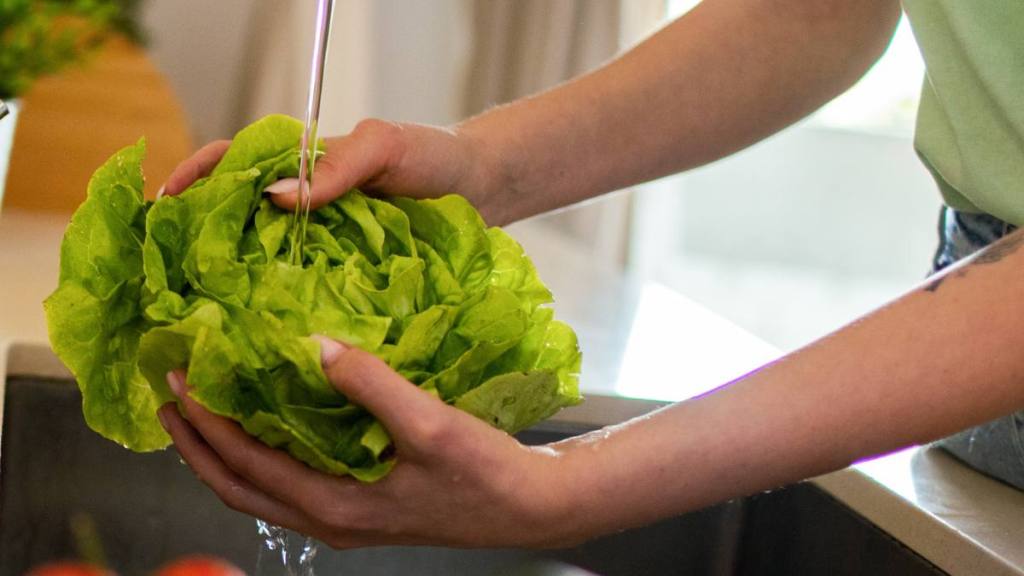
Nitrate-rich foods include: fennel, parsley, arugula, romaine lettuce, beets, and celery.
Nitrates are molecules containing oxygen and nitrogen. They’re found in many foods, including fruits, vegetables and cooked meat. You’ve probably heard of them, but you might have been told they’re bad for you. While nitrates found in meats, like bacon and sausage, have been linked to negative health outcomes, those found in fruits and vegetables seem to have a different effect.
A recent study in the journal Scientific Reports found that nitrate-rich foods, and more specifically, vegetable nitrates, seem to act as oral prebiotics. In other words, they feed the “good” bacteria inside your mouth and may reduce the risk of cavities, gum disease and bad breath. While more research needs to be done, scientists say these findings provide an excellent starting point for future studies focusing on nitrates and oral health.
The sip that keeps gums healthy
“Water is arguably the best beverage for oral and overall health,” Dr. Zuckerberg says. “Water dilutes acids, supports healthy saliva production, combats morning breath and rinses away food residue that cavity-causing bacteria feed on.”
Dr. Cu agrees, adding that “staying well hydrated is one of the simplest ways to reduce inflammation and support overall health.” Because gum disease is one of the most common types of inflammation, drinking water throughout the day makes a lot of sense.
Science supports these recommendations. A study conducted by Korean researchers and published in the journal Water found that people who consumed more water were less likely to experience cavities and gum disease. The same study found that each time a participant drank one less cup of water per day, their risk of gum disease increased.
More ways to keep your gums healthy
Eating a variety of vitamins, minerals and nutrients can support good oral health, but it’s not the only thing you need to do to prevent gum disease. “The best homecare hedge for staving off gum disease is brushing and flossing,” says Leena Palomo, DDS, MSD, Professor and Chair of the Ashman Department of Periodontology & Implant Dentistry at the NYU College of Dentistry.
For more on oral health, click through the links below!
Can You Brush Your Teeth Too Hard? Dentists Say ‘Yes’ — It Can Cause Gums To Recede
Why Are My Gums Bleeding? It Could Be a Sign of Vitamin C Deficiency
5 Simple Ways to Protect Your Teeth and Gums as You Age
Dentists Finally Settle the Debate on Using Mouthwash Before or After Brushing
This content is not a substitute for professional medical advice or diagnosis. Always consult your physician before pursuing any treatment plan.






